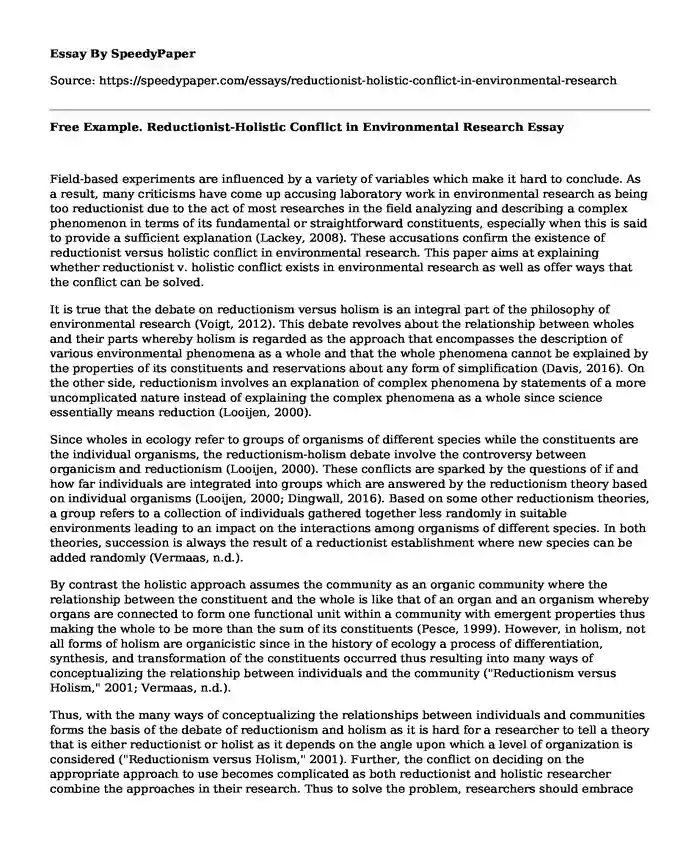
| Type of paper: | Essay |
| Categories: | Data analysis Biology Ecology |
| Pages: | 3 |
| Wordcount: | 714 words |
Field-based experiments are influenced by a variety of variables which make it hard to conclude. As a result, many criticisms have come up accusing laboratory work in environmental research as being too reductionist due to the act of most researches in the field analyzing and describing a complex phenomenon in terms of its fundamental or straightforward constituents, especially when this is said to provide a sufficient explanation (Lackey, 2008). These accusations confirm the existence of reductionist versus holistic conflict in environmental research. This paper aims at explaining whether reductionist v. holistic conflict exists in environmental research as well as offer ways that the conflict can be solved.
It is true that the debate on reductionism versus holism is an integral part of the philosophy of environmental research (Voigt, 2012). This debate revolves about the relationship between wholes and their parts whereby holism is regarded as the approach that encompasses the description of various environmental phenomena as a whole and that the whole phenomena cannot be explained by the properties of its constituents and reservations about any form of simplification (Davis, 2016). On the other side, reductionism involves an explanation of complex phenomena by statements of a more uncomplicated nature instead of explaining the complex phenomena as a whole since science essentially means reduction (Looijen, 2000).
Since wholes in ecology refer to groups of organisms of different species while the constituents are the individual organisms, the reductionism-holism debate involve the controversy between organicism and reductionism (Looijen, 2000). These conflicts are sparked by the questions of if and how far individuals are integrated into groups which are answered by the reductionism theory based on individual organisms (Looijen, 2000; Dingwall, 2016). Based on some other reductionism theories, a group refers to a collection of individuals gathered together less randomly in suitable environments leading to an impact on the interactions among organisms of different species. In both theories, succession is always the result of a reductionist establishment where new species can be added randomly (Vermaas, n.d.).
By contrast the holistic approach assumes the community as an organic community where the relationship between the constituent and the whole is like that of an organ and an organism whereby organs are connected to form one functional unit within a community with emergent properties thus making the whole to be more than the sum of its constituents (Pesce, 1999). However, in holism, not all forms of holism are organicistic since in the history of ecology a process of differentiation, synthesis, and transformation of the constituents occurred thus resulting into many ways of conceptualizing the relationship between individuals and the community ("Reductionism versus Holism," 2001; Vermaas, n.d.).
Thus, with the many ways of conceptualizing the relationships between individuals and communities forms the basis of the debate of reductionism and holism as it is hard for a researcher to tell a theory that is either reductionist or holist as it depends on the angle upon which a level of organization is considered ("Reductionism versus Holism," 2001). Further, the conflict on deciding on the appropriate approach to use becomes complicated as both reductionist and holistic researcher combine the approaches in their research. Thus to solve the problem, researchers should embrace the use of both reductionist and holist approaches in their research to ensure that some environmental researches are not considered to be more reductionist than others.
References
Davis, J. E., (2016). Introduction Holism against Reductionism. To Fix or to Heal. doi:10.18574/nyu/9781479878246.003.0001
Dingwall, R., (2016). Reductionism, Holism, and Consumerism. To Fix or to Heal. doi:10.18574/nyu/9781479878246.003.0005
Lackey, J., (2008). A Critique of Reductionism and NonReductionism. Learning from Words, 141-175. doi:10.1093/acprof:oso/9780199219162.003.0006
Looijen, R. C., (2000). Holism and Reductionism. Holism and Reductionism in Biology and Ecology, 3-24. doi:10.1007/978-94-015-9560-5_1
Looijen, R. C., (2000). The Inhibitory Effect of the Holism-Reductionism Dispute: A Controversy in Island Biogeography and its Solution. Holism and Reductionism in Biology and Ecology, 269-299. doi:10.1007/978-94-015-9560-5_12
Looijen, R. C., (2000). Holism and Reductionism in Biology and Ecology. doi:10.1007/978-94-015-9560-5
Pesce, M., (1999). Reductionism versus Holism: multiple models of the spiritual quest. Technology in Society, 21(4), 457-470. doi:10.1016/s0160-791x(99)00026-3
Reductionism versus Holism. (2001). The Triplet Genetic Code, 71-76. doi:10.1142/9789812810427_0009
Vermaas, P. E. (n.d.). Holism versus reductionism. A Philosopher's Understanding of Quantum Mechanics, 224-251. doi:10.1017/cbo9780511608230.017
Voigt, A., (2012). Reductionism Versus Holism. Oxford Bibliographies Online Datasets. doi:10.1093/obo/9780199830060-0063
Cite this page
Free Example. Reductionist-Holistic Conflict in Environmental Research. (2023, Jan 19). Retrieved from https://speedypaper.com/essays/reductionist-holistic-conflict-in-environmental-research
Request Removal
If you are the original author of this essay and no longer wish to have it published on the SpeedyPaper website, please click below to request its removal:
- Minimum Wage - Economics Essay Example
- Social Media Influence Essay Sample
- Marketing Essay Example on Product Strategy
- Twelve Characteristics of an Effective Teacher: Essay Example
- Free Essay: Participatory Evaluation in the Context of Educational Technology
- Free Essay Sample on Childhood-Onset Fluency Disorder (Stuttering)
- Free Essay: The Federal Reserve Cutting Minimum Unreasonable Interest and Fed-Funds Rates
Popular categories




